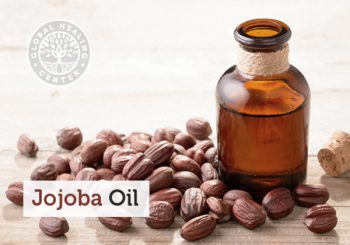Guest Writer for Wake Up World
Pronounced hu-HO-buh, the jojoba plant is a wonder of nature. Native to the American southwest, its golden oil has been used for hundreds of years. Various Native American tribes living in the Sonoran Desert used jojoba oil not only to moisturize their skin but also to treat skin conditions and infections.[1, 2] Some even call it liquid gold.
[pro_ad_display_adzone id=”110028″]
This incredible oil is still widely used today — mostly in cosmetics. You can make your own products with jojoba, whether to soothe rough skin, treat acne or other skin blemishes, or to keep your skin looking youthful. Keep reading to learn more about the benefits of this incredible oil plus our favorite recipes.
How Jojoba Oil Benefits You
- Helps Acne
- Reduces Skin Infections
- Helps Wounds Heal
- Has Anti-Aging Properties
- Supports Healthy Hair
- Moisturizes Skin & Hair
What Is Jojoba?
Jojoba (Simmondsia chinensis) grows native in the Sonoran Desert of California, Arizona, and northern Mexico. Also called coffeeberry or goat nut, this drought-resistant desert shrub produces seeds that contain a valuable golden-colored oil.
Both Cahuilla and Papago Indians used the oil for therapeutic purposes — creating poultices on the skin to heal wounds. Other tribes used jojoba for culinary purposes, though today, it’s mostly used for skin care.
The seeds, also called jojoba nuts, are about the size of an olive. They’re made up of more than 50 percent fat.[1, 2] That’s a very oily seed! And that oil is excellent for skin health.
What Is Jojoba Oil?
Originally, Native Americans used a mortar and pestle to grind the seeds to harvest their oils. Although we call it an “oil,” the product of jojoba seeds is closer to liquid wax. As a “liquid wax ester,” it is similar in structure to sebum, the waxy substance our skin produces.
Rich in triglycerides and fatty acids, jojoba oil makes an incredible all-around, multi-tasking moisturizer. Unlike some other oils, jojoba wax does not get rancid or rotten. That means one bottle can last a long time! It can withstand high heat, which is helpful if you apply it to your hair before using a hairdryer or curling iron.
Cosmetic companies refine it into a clear, odorless fluid for use in skin care products.[3, 4]
Jojoba Oil Benefits
Today, jojoba is used mostly for cosmetic products for skin and hair. One of the best things about jojoba oil is that it does not irritate the skin.[1] In other words, it’s non-comedogenic and won’t clog pores.[5] Here are a few of the most popular uses for this versatile oil.
Helps Acne
Jojoba oil is useful for acne, partly because of its similarity to human sebum, produced by glands near your hair follicles. Because it is so similar to the body’s natural oil — sebum — it tricks the skin into producing less. The result is less oily skin for those prone to breakouts.
Jojoba also reduces skin inflammation, another part of the reason it improves skin lesions, like acne.[6] Jojoba oil also helps increase the absorption of other topical medications; you can use it as a carrier oil for other herbal remedies or essential oils.[7] Try a clay facial mask with jojoba oil to reduce the number of pimples and improve acne breakouts.[5]
Reduces Skin Infections
There’s a rich history of Native Americans using jojoba oil to reduce skin infections. They knew what they were doing: Jojoba oil has been found to have antimicrobial and antifungal properties.[8] That means it can keep harmful bacteria and fungus from spreading on the skin.
This antimicrobial trait means it’s useful not just for acne, which is often caused by bacteria, but also other wounds and sores. Jojoba oil provides a protective barrier on the skin, preventing infections from occurring.
Helps Wounds Heal
It turns out that jojoba oil can significantly speed up wound closure.[9] How? Experts have found that this unique oil stimulates your cells’ ability to produce collagen.[9] Collagen is a protein that plays a critical role in your skin’s health, helping to hold skin tissue together.
Jojoba is also rich in vitamin E, which acts as an antioxidant and protects your skin cells against free radicals.[10] You can use jojoba oil on minor scratches and irritations to promote healing. Plus, the antimicrobial properties will help the wound stay clean and avoid becoming infected.
Has Anti-Aging Properties
Jojoba oil is widely reported to have anti-aging properties. First, keeping your skin moisturized is an important part of any anti-aging skin care routine. But jojoba contains a healthy amount of vitamin E, which in itself is a popular ingredient in many anti-aging creams.
As mentioned, because jojoba is so similar to sebum, it can help your skin produce less grease (this is true in both hair and skin products). It even has a natural sunscreen of SPF4.[4] Keeping your skin protected from the damaging rays of the sun is an essential aspect of preventing premature skin aging.
Supports Healthy Hair
Some people swear jojoba oil promotes hair growth, but the jury is out. You can definitely use it as a carrier for other, more potent essential oils that help hair growth. Together, these oils work their magic on your hair.[11] If you’re dealing with hair loss or thinning, try lavender essential oil mixed with jojoba.[10, 11] You might also consider a biotin supplement.
Jojoba oil is used by some to promote hair thickness and shine. It adds moisture to your locks, thus minimizing breakage and split ends. If used on the scalp, it can nourish the hair follicles. Being similar to sebum, it will not lead to greasy hair or a greasy scalp but can lend a lovely shine to your tresses.
Moisturizes Skin & Hair
Irritants, allergens, and toxins continually barrage your skin. Moisturizing can help protect your skin’s natural barrier. Since jojoba oil is a liquid wax, it can repair damaged skin by creating an artificial barrier. And the great thing? It works well whether you have oily skin, dry skin, or a combination!
Eczema, dermatitis, and psoriasis involve damage to the skin’s natural skin barriers. And guess what? All of these conditions have shown improvement with jojoba oil.[12, 13] Jojoba oil is a great way to keep your skin hydrated in a natural, non-toxic way.
Jojoba Oil Uses & DIY recipes
When you go to the store or shop online, you’ll find so many oils and products available that it is often difficult to figure out which one to buy. I recommend you choose organic, food-grade, cold-pressed jojoba oil without any additives whenever possible. Remember, your skin is the largest organ in your body. If a substance is not clean enough to eat, you shouldn’t rub it on your skin.
Instead of shopping for products, try making them yourself. We developed these simple DIY jojoba oil recipes for your beauty and skin care regimen. Making these recipes can be a fun activity with your kids. They’re also great as personalized gifts for friends and families.
Don’t be afraid to get creative — if you don’t like the smell or texture of one of the oils suggested here, switch it out for a different one that you prefer.
Soothing Jojoba Moisturizer
When it comes to using jojoba oil to moisturize, simple is the way to go. All it requires is dabbing the oil onto your fingers and rubbing it into your skin. You can also try this method for dry nail beds and cuticles, razor burn, or any other area as desired. If you have oily or sensitive skin, add a bit of jojoba oil to your usual moisturizer when your face is feeling dry.
How to Use: Massage three drops into your face in the morning. For dry nail beds, dab three drops onto your cuticles and massage in.
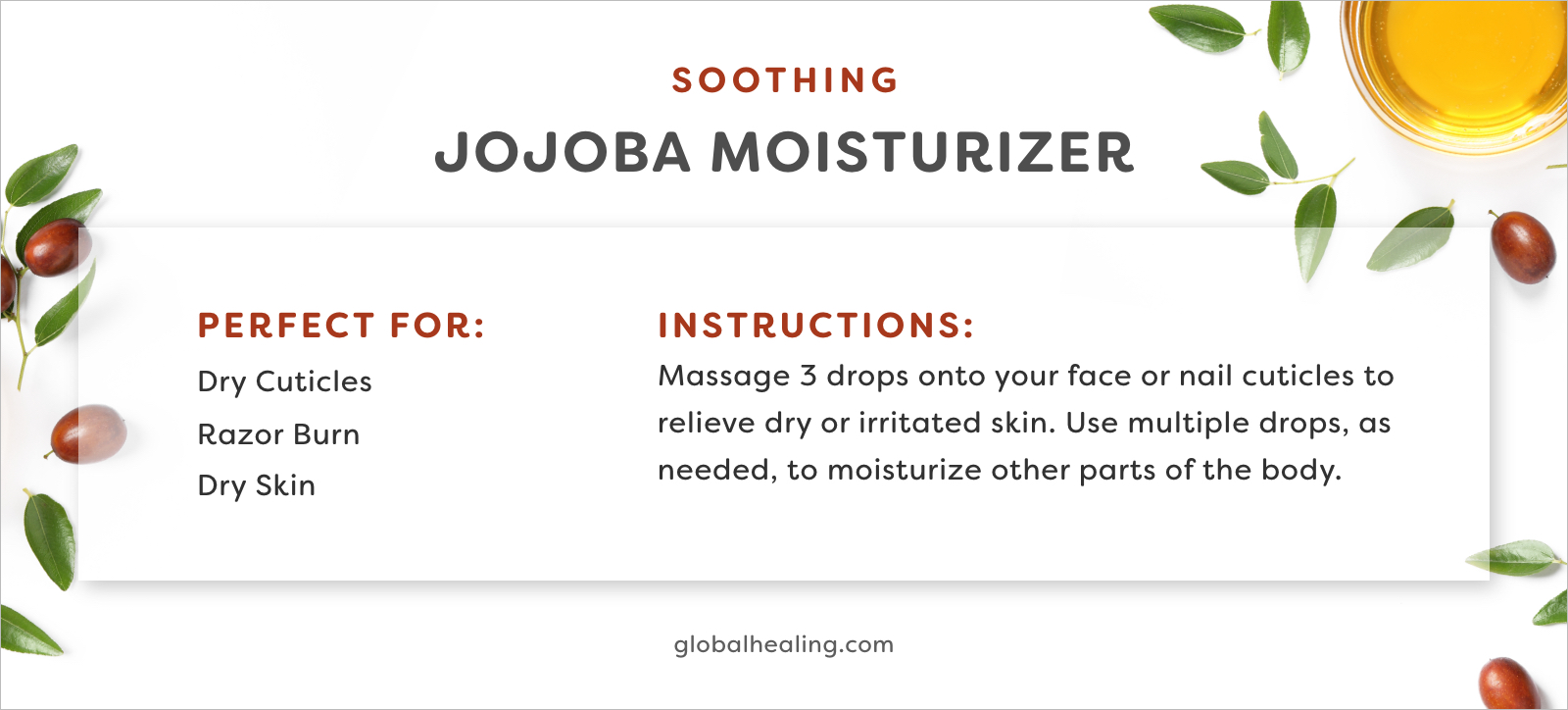
Acne-Free Clear Skin Recipe
If you’re fighting breakouts, jojoba oil can come to the rescue! Try this simple recipe to take advantage of its antimicrobial and wound-healing properties.
Ingredients
- 2 tablespoons jojoba oil
- 2 tablespoons aloe vera gel
Directions
- Combine jojoba oil and aloe vera gel in a container.
- Mix thoroughly.
- Take a dime-sized amount, rub it together in your hands, and apply over your face while in the shower.
- Let the mixture stay on for 30 seconds, then rinse off gently.
- Repeat twice per week for maximum benefit.
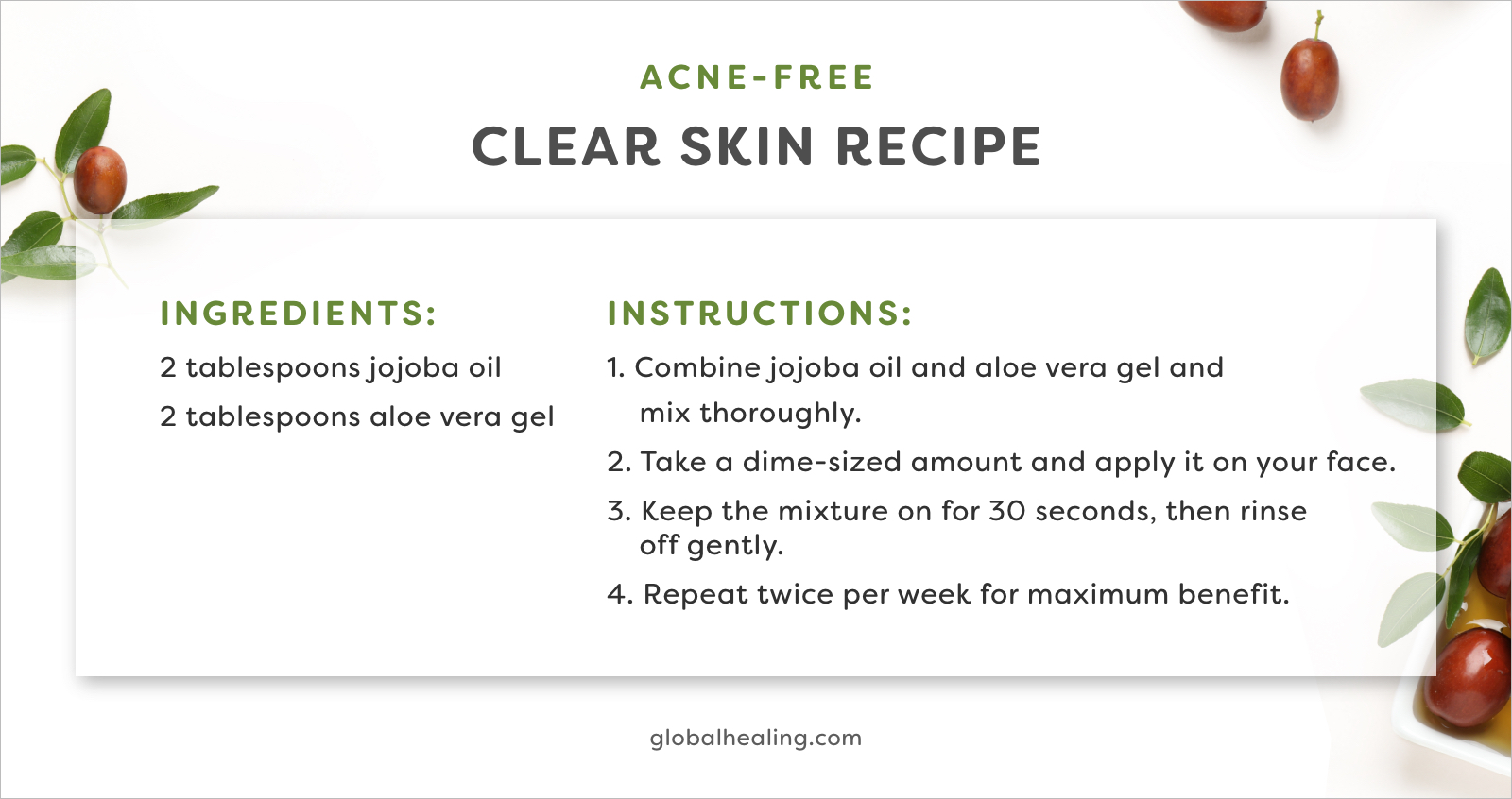
Nourishing Jojoba Lip Balm
This simple DIY lip treatment uses natural ingredients to moisturize chapped lips. Adding in peppermint oil will make it taste and smell great — and it even repels certain harmful organisms that target the lips.[14]
Ingredients
- ¼ teaspoon jojoba oil
- ¼ teaspoon shea butter
- ¼ teaspoon olive oil
- 1 drop peppermint essential oil
Directions
- Mix the ingredients together.
- If you experience any difficulty combining them, heat them gently over low heat on the stove, constantly stirring, for no more than 60 seconds.
- Let cool and store in a glass container.
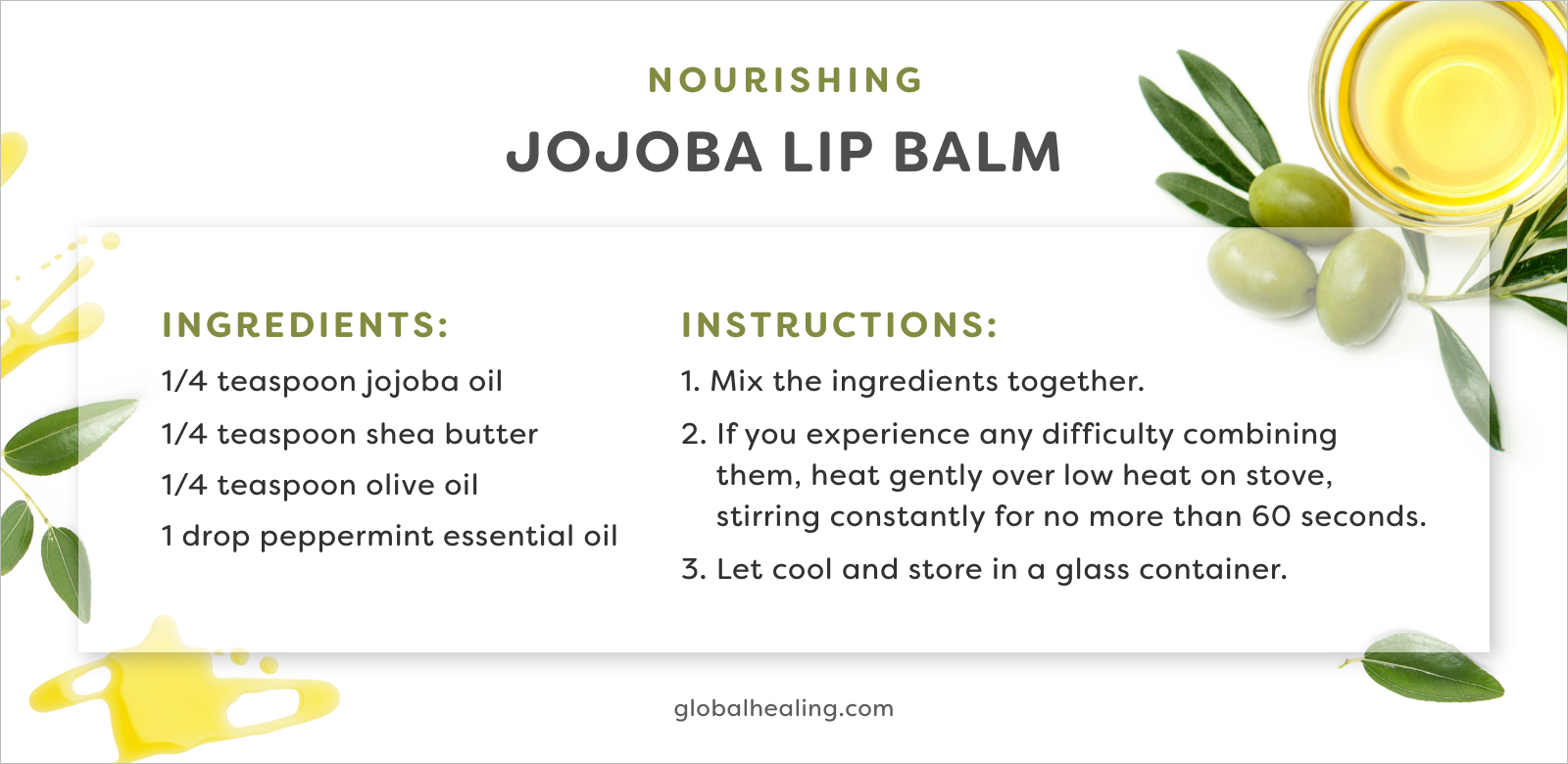
Quick Relief Sunburn Oil
Unfortunately, some sun damage is permanent at the cellular level.[15] But the good news is that you can use oil to soothe and hydrate your skin — and jojoba has natural sun protection factors. Almond oil can also prevent damage from UV radiation, so this oil blend is fantastic for protecting against sun damage, in addition to soothing skin after sun exposure.[16]
Ingredients
- 1 teaspoon jojoba oil
- ½ teaspoon argan oil
- 2 tablespoons almond oil
- 2 tablespoons coconut oil
Directions
- Mix the oils together.
- Gently apply to sunburned skin.
- Depending on how large the sunburned area is, double or halve the recipe to get the amount desired.
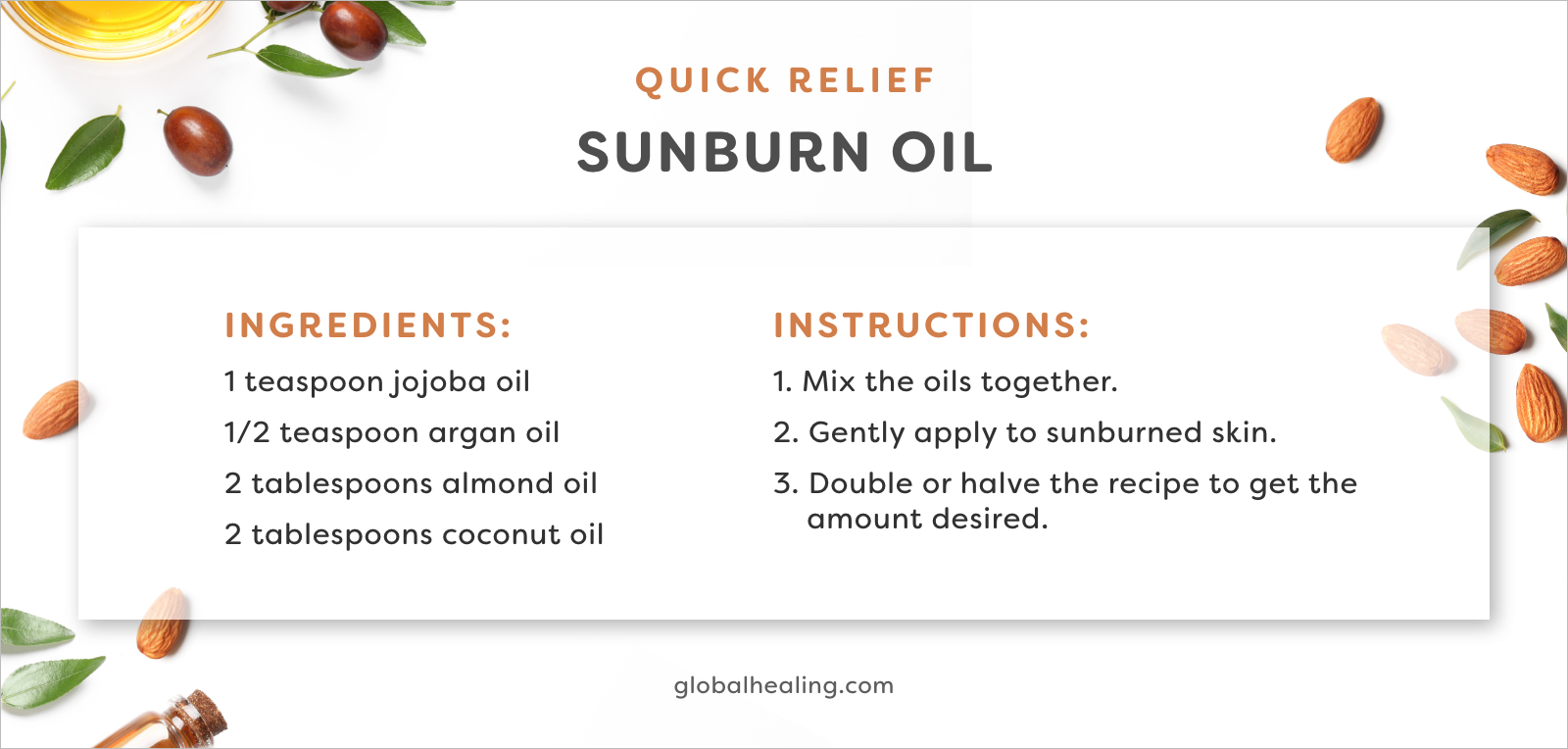
All-Natural Makeup Remover
You can use jojoba oil to remove makeup naturally. In a pinch, put a few drops directly on your fingers and gently massage the oil in until you can wipe off your makeup. If you have time to make this recipe, the vitamin E oil will provide extra moisture. You can get vitamin E oil on its own or poke a vitamin E capsule with a pin, squeezing out the drops. This combination of oils is gentle enough to use for eye makeup removal. However, because the recipe contains water, you shouldn’t store it for later use; make enough for one use at a time.
Ingredients
- 1 teaspoon jojoba oil
- 2 drops vitamin E oil
- 1 tablespoon distilled water
Directions
- Add all the ingredients to a bottle.
- Shake well.
- Gently apply a couple of drops to the area of skin where you want to remove makeup.
- Use a cotton ball or washcloth to wipe away makeup.
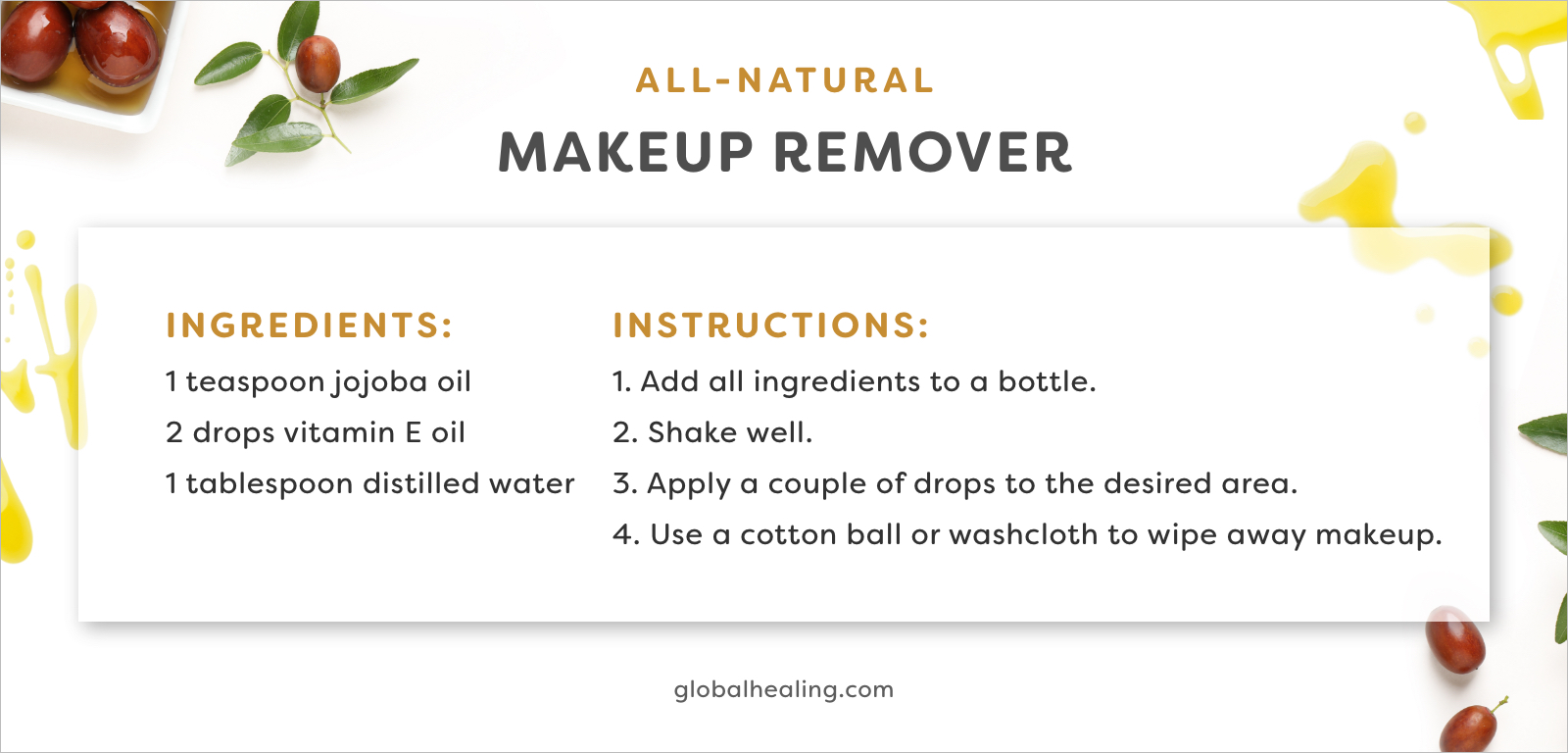
Soft & Shiny Hair Treatment
A dry, itchy scalp can be annoying, embarrassing, and even painful. This recipe will turn your favorite conditioner into a rescue treatment that will help keep your hair soft and shiny, with the added dandruff-fighting (antifungal) benefits of castor oil.[17] In addition, jojoba’s wound-healing properties will help repair any areas you’ve scratched. If you want to boost hair growth or prevent hair loss, maintaining a healthy scalp is important — make sure you are consuming enough vitamins and minerals to do so.
Ingredients
- 1 tablespoon jojoba oil
- 1 tablespoon coconut oil
- 3 drops virgin castor oil
- 2 tablespoons of your favorite conditioner
- 3 drops of your favorite essential oil
Directions
- Mix all the ingredients together.
- Massage into your scalp.
- Leave on for 20 minutes.
- Wash your hair thoroughly.
Because of the high oil content of this recipe, you might have to wash twice to get all the oil out.
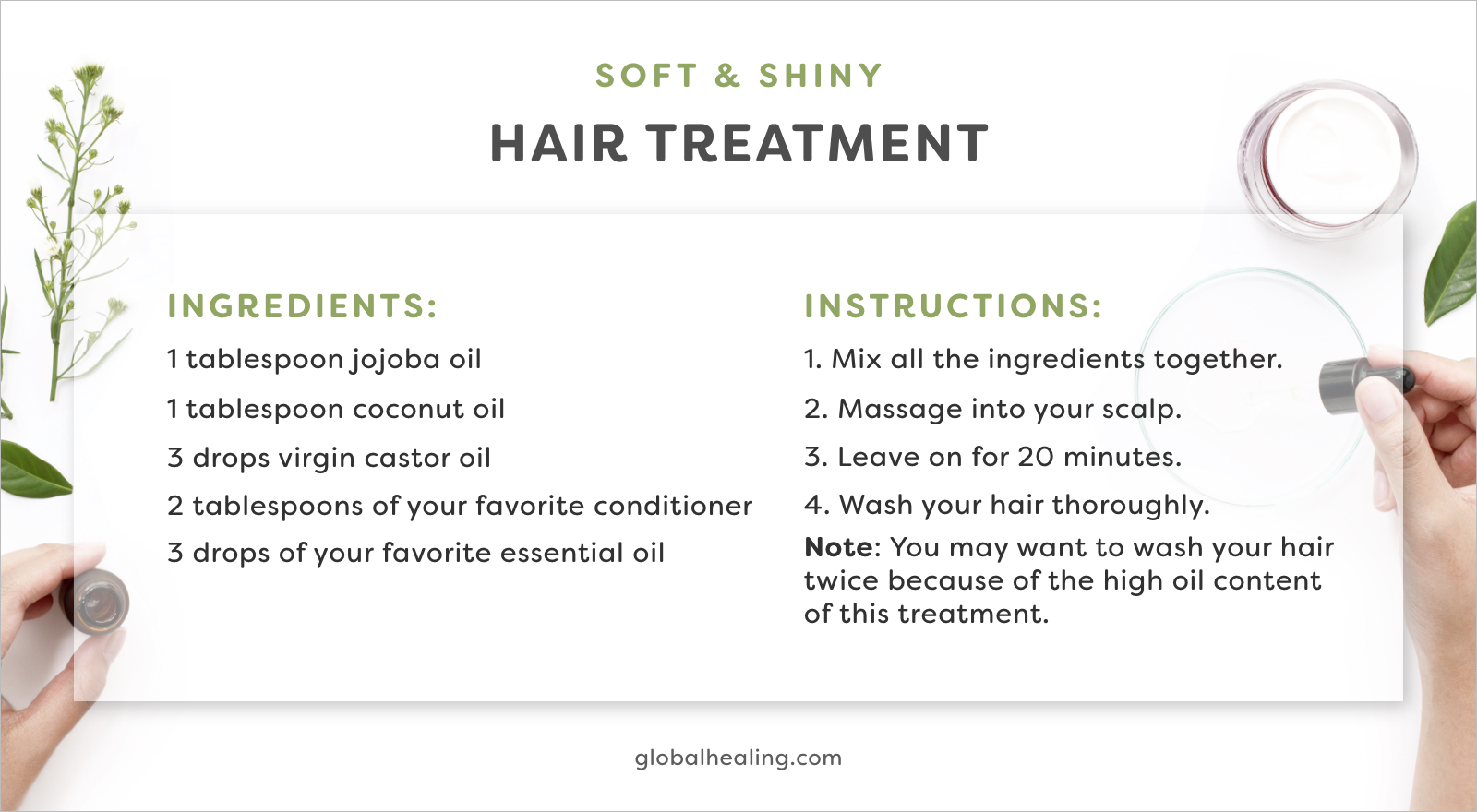
Rejuvenating Vanilla Body Scrub
Exfoliation is a key part of any skin care regimen. Sugar scrubs are gentler than salt scrubs because they have round granules without sharp edges. Sugar also dissolves more easily in hot water. However, if you want to exfoliate rougher skin like elbows or feet, use Himalayan pink salt instead of sugar.
Don’t store this recipe in the shower, where it might get contaminated with mold or bacteria. It does not have as long of a shelf life as over-the-counter products since it contains no preservatives. But that means it’s healthier!
Ingredients
- 1 tablespoon jojoba oil
- 1 tablespoon coconut oil
- 1 teaspoon vanilla extract
- ½ cup coarse organic sugar
Directions
- Combine all the ingredients in a bowl.
- Mix them well. The sugar should partially absorb the liquids, forming a paste.
- Massage into skin and rinse with warm water.
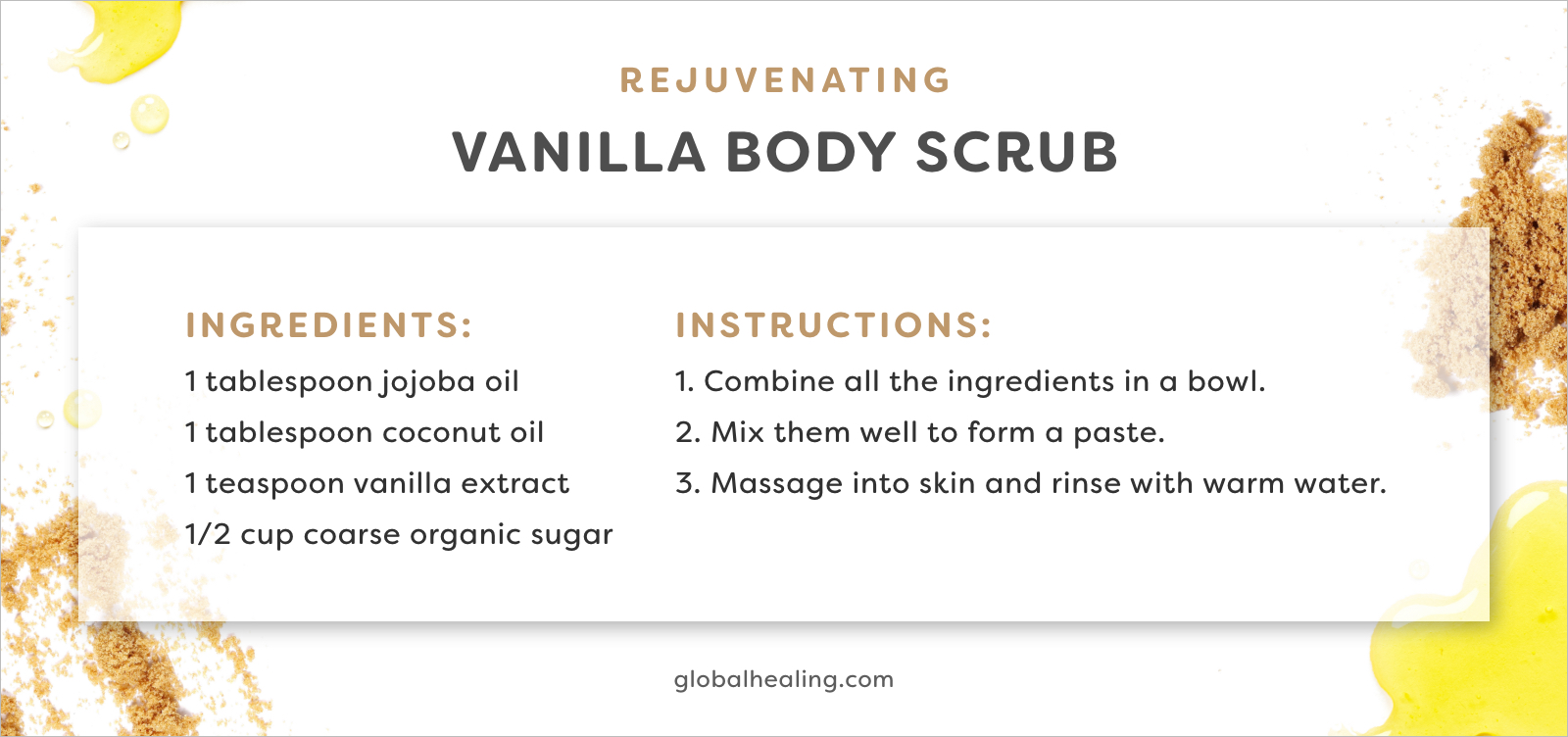
Precautions & Side Effects
The great news is that jojoba oil has no side effects for most people. With any natural product, some people have allergies or sensitivities, so it is still a good idea to test the DIY recipes on a small patch of skin before applying more widely. If you have any reaction, don’t use jojoba oil on your face or body.
If you have an active infection, before applying any remedy such as jojoba oil, talk to your healthcare professional for specific advice.
Points to Remember
Jojoba oil is jam-packed with vitamins that speed up wound healing, heal acne, and naturally moisturize skin. You can use jojoba oil to boost your skin health and hair moisture.
You can create your own DIY recipes with organic oils, which can help your skin and hair without chemical preservatives and fillers. If you do buy over-the-counter products, look for organic products not tested on animals.
References:
- Final report on the safety assessment of jojoba oil and jojoba wax. Int J Toxicol. 1992;11(1):57-74.
- Undersander D, et al. Jojoba. Alternative Field Crops Manual. University of Wisconsin-Extension, Cooperative Extension. Updated 4 Nov 2019. Accessed 4 Nov 2019.
- Native Plant Oils: Essential Oils. US Forest Service, United States Department of Agriculture. Accessed 4 Nov 2019.
- Jojoba. College of Agriculture & Life Sciences, Arizona State University. Accessed 4 Nov 2019.
- Meier L, et al. Clay jojoba oil facial mask for lesioned skin and mild acne—results of a prospective, observational pilot study. Forsch Komplementmed. 2012;19(2):75-79.
- Habashy R, et al. Anti-inflammatory effects of jojoba liquid wax in experimental models. Pharmacol Res. 2005;51(2):95-105.
- Pazyar N, et al. Jojoba in dermatology: a succinct review. G Ital Dermatol Venereol. 2013 Dec;148(6):687-691.
- Menghani E, et al. Search for antimicrobial potentials from Simmondsia chinensis. Int J Pharm Sci Res. 2012;3(7):2093-2097.
- Ranzato E, et al. Wound healing properties of jojoba liquid wax: an in vitro study. J Ethnopharmacol. 2011 Mar 24;134(2):443-449.
- Vitamin E: Fact Sheet for Health Professionals. Office of Dietary Supplements, National Institutes of Health. Updated 10 Jul 2019. Accessed 31 Oct 2019.
- Lee BH, et al. Hair growth-promoting effects of lavender oil in c57bl/6 mice. Toxicol Res. 2016 Apr; 32(2): 103-108.
- Lin T, et al. Anti-inflammatory and skin barrier repair effects of topical application of some plant oils. Int J Mol Sci. 2018 Jan;19(1):70.
- Nasr M, et al. Jojoba oil soft colloidal nanocarrier of a synthetic retinoid: preparation, characterization and clinical efficacy in psoriatic patients. Curr Drug Deliv. 2017;14(3):426-432.
- Shrivastava A. A review on peppermint oil. Asian J Pharmaceutical and Clinical Research. 2009 May;2(2):27-33.
- Sunburn. Medline Plus, US National Library of Medicine. 29 Nov 2018.
- Sultana Y, et al. Effect of pre?treatment of almond oil on ultraviolet B–induced cutaneous photoaging in mice. J Cosmet Dermatol. 2007;6(1):14-19.
- Van Der Steen M, Stevens CV. Undecylenic acid: a valuable and physiologically active renewable building block from castor oil. ChemSusChem. 2009;2(8):692-713.

